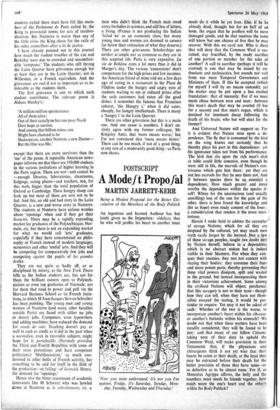A Modejt. Propofal
POSTSCRIPT MARTIN JARRETT-KERR
Being a Modest Proposal for the Better Cir- culation of the Members of the Body Politick An ingenious and learned Authour has but lately given us the Injunction: videlicet, that he who will proffer his heart to another must 'Now you must understand, it's not you I'm against, Friday, it's Saturday, Sunday, Mon- day, Tuesday, Wednesday and Thursday.' needs do it while he yet lives. Else, if he be already dead, thought but for an half of an hour, the organ that he proffers will be mere damaged goods, and he that receives the same will know but one chance of five that he may recover. With this we cavil not. Who is there will know but one chance of five that he may recover. With this we cavil not. Who is there that will deny that the Common Weal is sus- tained, nay fructified, by the ready sacrifice of one portion or member for the sake of another? A call to sacrifice (perhaps it will be averred) is one that may be issued by en- thusiasts and ecclesiastics, but sounds not well from our mere Temporal Governours and Ministers of State. If this be accepted (which for myself I will by no means concede), yet the matter may be put upon a less exalted foundation: that of necessity. For if we must needs chuse between man and man: between this man's death that may be averted (if but for a season) and that man's organ, which is destined for imminent decay following the death of his brain; who but will elect for the former?
And Universal Nature will support us. For it is evident that Nature rests upon a de- pendence. The fly that is consumed by the bird on the wing knows not certainly that he thereby plays his part in this dependence: yet his ignorance takes not from his performance. The bird that sits upon the rich man's dish at table could little conceive, even though he were still in life, the marvels of Nature's con- trivance which gets him there: yet they are not less marvels for that he sees them not. And if between species there be so, essential a dependence; How much greater and more worthy the dependence within the species it- self! Where for the unconscious (and usually unwilling) loss of the one for the gain of the other, there is here found the knowledge and (let us hope) even ready consent of the loser: a consideration that renders it the more meri- torious.
Herein I make bold to adduce the exemplar of savage Nations, which for all they are despised by the cultured, yet may teach men -truth easily forgot by the learned. Not a few of these savage peoples, taught (we doubt not) by Nature herself, believe in a dependence which is no abstract notion but is indeed visible in their Manners. For when they con- quer their enemies, they rest not content with slaying their bodies: they consume their finer and more potent parts; thereby preventing that these vital powers dissipate, spilt and wasted in the ground, but instead incorporating them in their victorious achievement. Some among the civilised Nations will object, perchance, that this savagery is not to their taste—though how they can tell, when they have not them- selves essayed the tasting, it would be par- ticular to enquire. Yet may it not be asked of such: Whether of the two is the worse, to incorporate another's heart within his rib-case. or another's buttocks within his stomach? We doubt not that when these matters have been steadily considered, they will be found to be just: and that many of our fellow Citizens, taking note of their duty to uphold the Common Weal, will make provision in their Testaments that, if the physicians and chirurgeons think it not yet wise that their hearts be eaten at their death, at the least they may be extracted before their death for the better provision of those that have none—or so defective as to be almost none. For if, as Menenius Agrippa affirms, the belly and the members must needs be friends together, how much more the one's heart and the other's within the Body Publick?






































 Previous page
Previous page